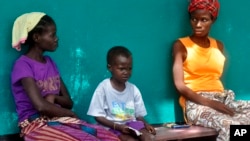The Ebola epidemic’s death toll has climbed to at least 4,922 out of 10,141 known cases in eight countries, the World Health Organization reported Saturday.
The count reflected data through Thursday, WHO said. One of the virus’ most recent victims was a 2-year-old Mali girl who died Friday after returning from a trip to neighboring Guinea, Mali health officials said. The toddler became Mali’s first confirmed Ebola casualty.
Diplomatic sources have expressed concern about the ability of Mali, one of the world’s poorest countries, to contain an outbreak. The WHO said the girl and her family traveled through the country by bus and warned that many passengers could be in danger of contracting the disease. Some 43 people already are being monitored.
The United Nations on Saturday flew one metric ton of emergency relief supplies to Mali, including personal protection kits, gloves and face shields.
The World Food Program director for West Africa, Denise Brown, says speed is of the essence in the Ebola crisis, adding that U.N. agencies are working around the clock to confront the virus.
The contagion also threatens Ivory Coast, the world’s biggest cocoa producer, Reuters news agency reported.
West Africa bears heaviest burden
While scattered cases have been reported in the United States and Europe, the Ebola outbreak has been concentrated in the West African countries of Guinea, Liberia and Sierra Leone.
The three nations accounted for 4,912 of all deaths to date – a figure that health experts fear may be significantly underreported. The WHO estimated the true toll may be 1.5 times higher in Guinea, 2.5 times higher in Liberia and twice the reported rate in Sierra Leone, according to Reuters.
In those countries, many families have tried to care for ailing relatives at home, rather than taking them to treatment centers already overcrowded with Ebola sufferers in the highly infectious end stages of the disease.
U.S. Ambassador to the United Nations Samantha Power is heading to the region to "push other countries to do more."
Announcing plans to visit Guinea, Liberia, and Sierra Leone, she told reporters Saturday that the benefits of having first-hand knowledge of what is going on there far outweighs what she calls the "almost nonexistent risk."
Power will visit Ebola coordination centers and meet with top government officials, U.S. health experts and military forces combating the disease.
US quarantines
In the United States, health officials in Newark, New Jersey, report that a woman suspected of having the Ebola virus has tested negative. The woman had been quarantined after arriving ill from West Africa, but a test showed no infection.
The woman will remain quarantined for 21 days — the virus's incubation period — under terms of a program announced Friday by New York Governor Andrew Cuomo and New Jersey Governor Chis Christie. Any travelers arriving in the New York area who have had contact with Ebola-infected patients in West Africa will now face the mandatory three-week quarantine.
Illinois Governor Pat Quinn has also ordered a mandatory 21-day quarantine for so-called high-risk people arriving in the Midwestern American state from Guinea, Liberia, or Sierra Leone.
Calling the protective measure "too important to be voluntary," Quinn said the directive covers anyone who had direct contact with an Ebola patient.
Another American Ebola patient, Dr. Craig Spencer, is being treated in New York, where he recently returned to his home after caring for Ebola victims in Guinea. Confirmation on Thursday that he had contracted the virus prompted the new quarantine measures at the international airports in New York City and nearby Newark.
Two American nurses who contracted Ebola while caring for a Liberian-American virus victim in Dallas, Texas, have now been declared healthy and virus-free after hospital treatment.
U.S. President Barack Obama urged Americans Saturday in his weekly address to be "guided by the science" in the fight against Ebola. He said "we have to be guided by the facts, not fear."
Vaccine surge anticipated
The WHO said Friday it expected hundreds of thousands of doses of Ebola vaccine to be ready by the first half of 2015.
European Union leaders announced Friday they have secured $1.25 billion to help fight the Ebola crisis in West Africa.
Some information for this report was contributed by Reuters.





